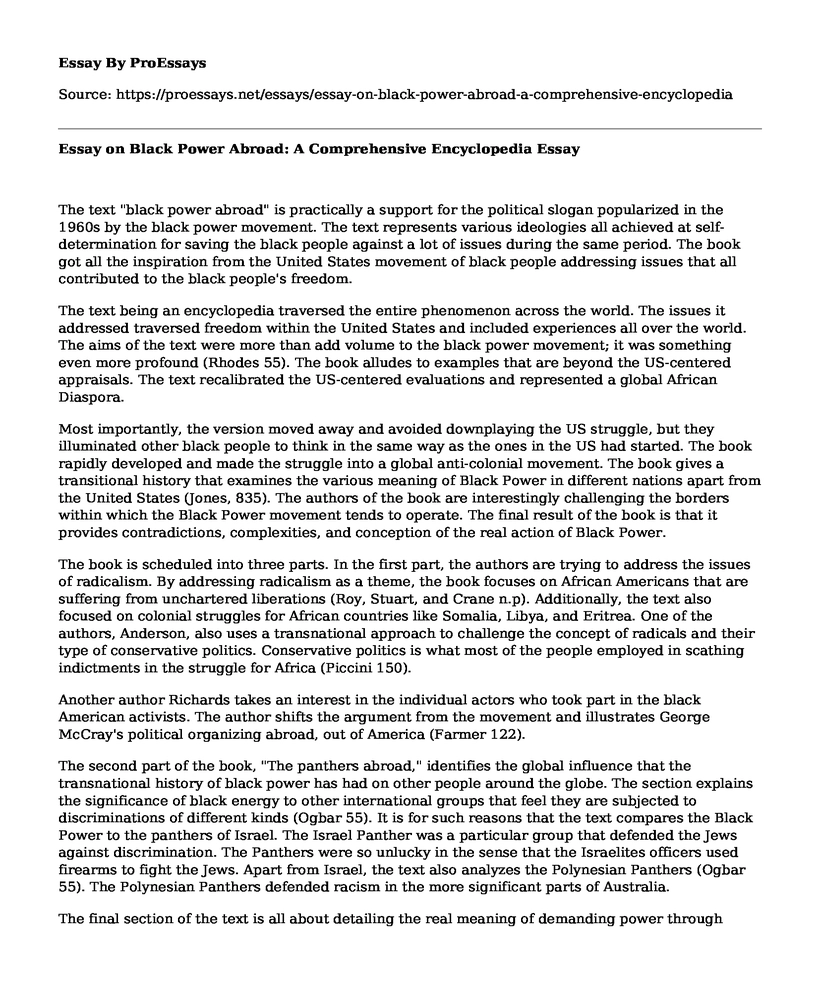The text "black power abroad" is practically a support for the political slogan popularized in the 1960s by the black power movement. The text represents various ideologies all achieved at self-determination for saving the black people against a lot of issues during the same period. The book got all the inspiration from the United States movement of black people addressing issues that all contributed to the black people's freedom.
The text being an encyclopedia traversed the entire phenomenon across the world. The issues it addressed traversed freedom within the United States and included experiences all over the world. The aims of the text were more than add volume to the black power movement; it was something even more profound (Rhodes 55). The book alludes to examples that are beyond the US-centered appraisals. The text recalibrated the US-centered evaluations and represented a global African Diaspora.
Most importantly, the version moved away and avoided downplaying the US struggle, but they illuminated other black people to think in the same way as the ones in the US had started. The book rapidly developed and made the struggle into a global anti-colonial movement. The book gives a transitional history that examines the various meaning of Black Power in different nations apart from the United States (Jones, 835). The authors of the book are interestingly challenging the borders within which the Black Power movement tends to operate. The final result of the book is that it provides contradictions, complexities, and conception of the real action of Black Power.
The book is scheduled into three parts. In the first part, the authors are trying to address the issues of radicalism. By addressing radicalism as a theme, the book focuses on African Americans that are suffering from unchartered liberations (Roy, Stuart, and Crane n.p). Additionally, the text also focused on colonial struggles for African countries like Somalia, Libya, and Eritrea. One of the authors, Anderson, also uses a transnational approach to challenge the concept of radicals and their type of conservative politics. Conservative politics is what most of the people employed in scathing indictments in the struggle for Africa (Piccini 150).
Another author Richards takes an interest in the individual actors who took part in the black American activists. The author shifts the argument from the movement and illustrates George McCray's political organizing abroad, out of America (Farmer 122).
The second part of the book, "The panthers abroad," identifies the global influence that the transnational history of black power has had on other people around the globe. The section explains the significance of black energy to other international groups that feel they are subjected to discriminations of different kinds (Ogbar 55). It is for such reasons that the text compares the Black Power to the panthers of Israel. The Israel Panther was a particular group that defended the Jews against discrimination. The Panthers were so unlucky in the sense that the Israelites officers used firearms to fight the Jews. Apart from Israel, the text also analyzes the Polynesian Panthers (Ogbar 55). The Polynesian Panthers defended racism in the more significant parts of Australia.
The final section of the text is all about detailing the real meaning of demanding power through either violence or non-violence means (Coles 233). Your William gives the audience a taste of wanting to revenge when he talks about Lumumba, who is a savior. It is for this concept that a perspective of black power militancy is developed. Black power militancy was not about armed struggle like in the Vietnam War; it was something about cultural nationalist aesthetic. The power later developed into a revolution.
In totality, the black power abroad reveals the transnational dimensions that the black power movement addressed the immediate and contingent needs and circumstances that surrounded groups that were discriminated against, beyond American rims.
Works Cited
Coles, Robert. Black writers abroad: A study of Black American writers in Europe and Africa. Routledge, 2018. 233
Farmer, Ashley D. Remaking Black Power: How Black women transformed an era. UNC Press Books, 2017. 122
Jones, Gillian Maris. "Black Lives Abroad: Encounters of Diasporic Solidarity in Brazil." Biography 41.4 (2018): 831-855.
Ogbar, Jeffrey OG. Black Power: Radical Politics and African American identity. Johns Hopkins University Press, 2019.55
Piccini, Jon. "Wider Horizons: Indigenous Australians Abroad and the Limits of Global Activism." Transnational Protest, Australia and the 1960s. Palgrave Macmillan, London, 2016. 149-179.
Rhodes, Jane. Framing the Black Panthers: The spectacular rise of a Black Power icon. University of Illinois Press, 2017. 55
Roy, Ananya, Stuart Schrader, and E. Crane. "Gray areas: The war on poverty at home and abroad." Territories of Poverty: Rethinking North and South (2015): 289.
Cite this page
Essay on Black Power Abroad: A Comprehensive Encyclopedia. (2023, Mar 02). Retrieved from https://proessays.net/essays/essay-on-black-power-abroad-a-comprehensive-encyclopedia
If you are the original author of this essay and no longer wish to have it published on the ProEssays website, please click below to request its removal:
- Stevenson's Portrayal of Human Nature in the Late Victorian Society
- Business Ethics Questions Essay Example
- Essay Sample on Global Environmental Policy: G8's Role in Environmental Protection
- Essay Example on Gender Equality: Women's Role in Society Evolving
- Essay on Canada's Federal System: Power Divided Among Provincial Governments
- Fast Fashion: Idol of Youth or Environmental Hazard? - Essay Sample
- Social Security: An Effective Support Program Reducing Mortality & Disparities - Essay Sample







